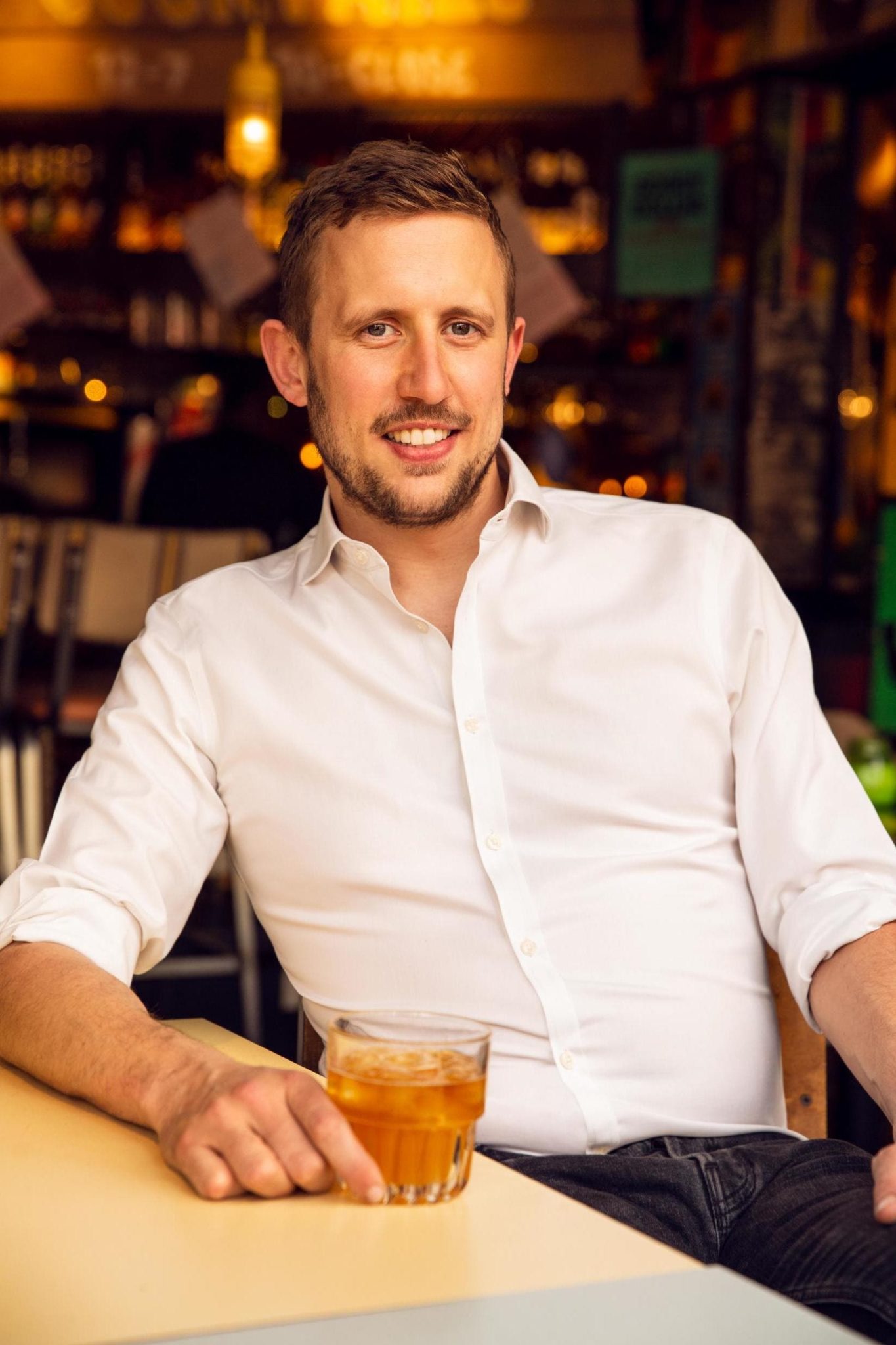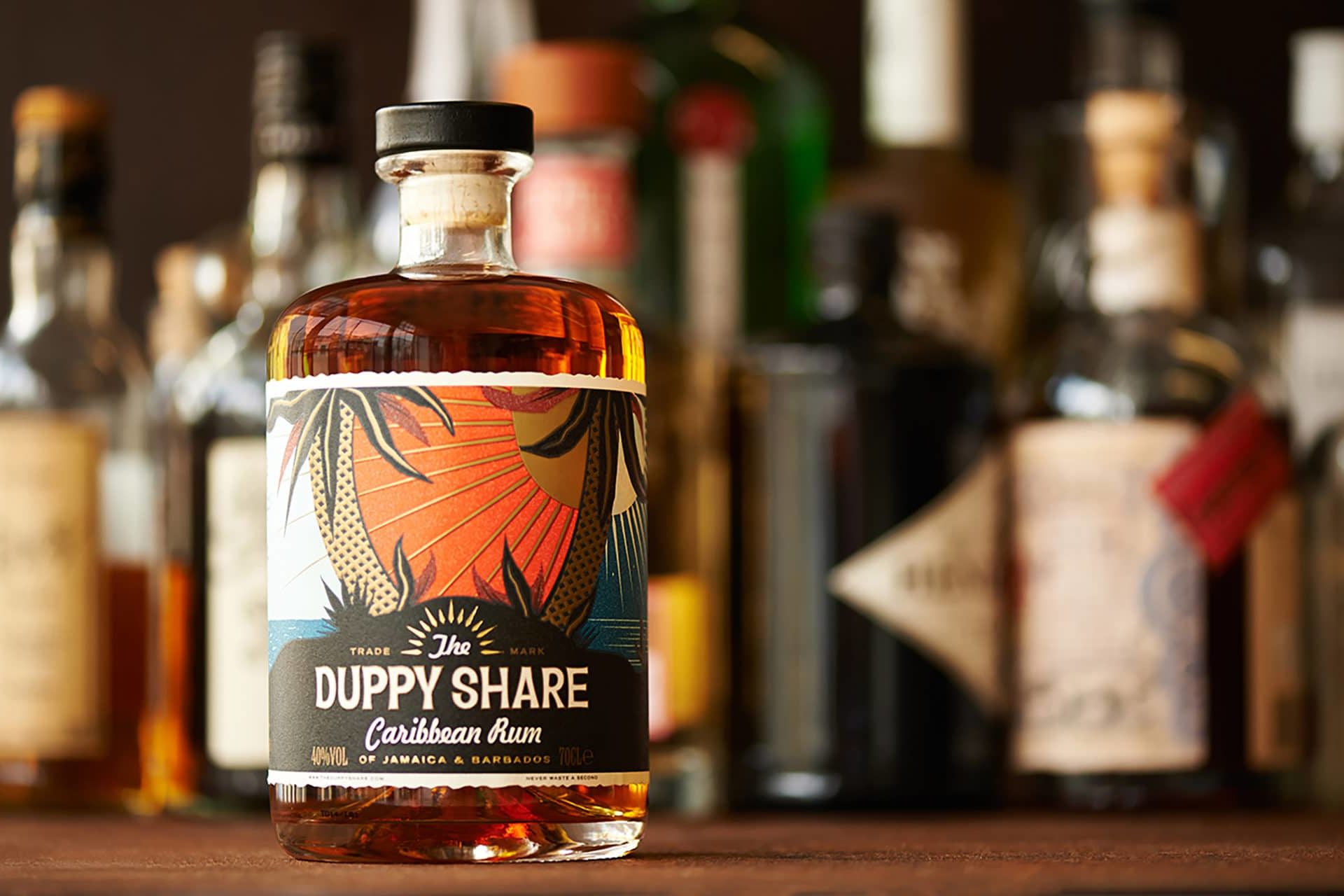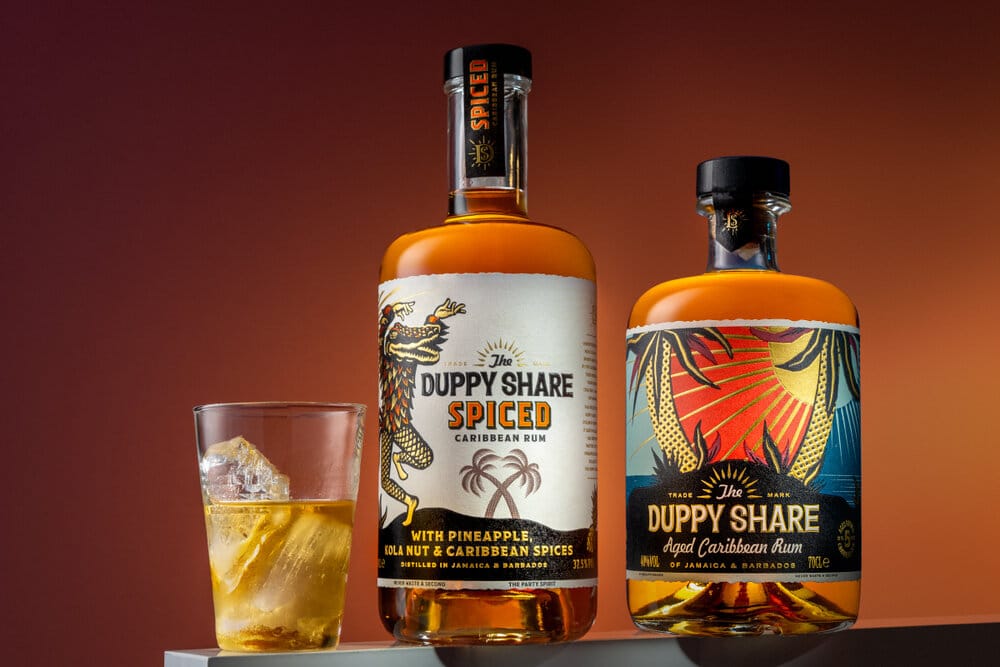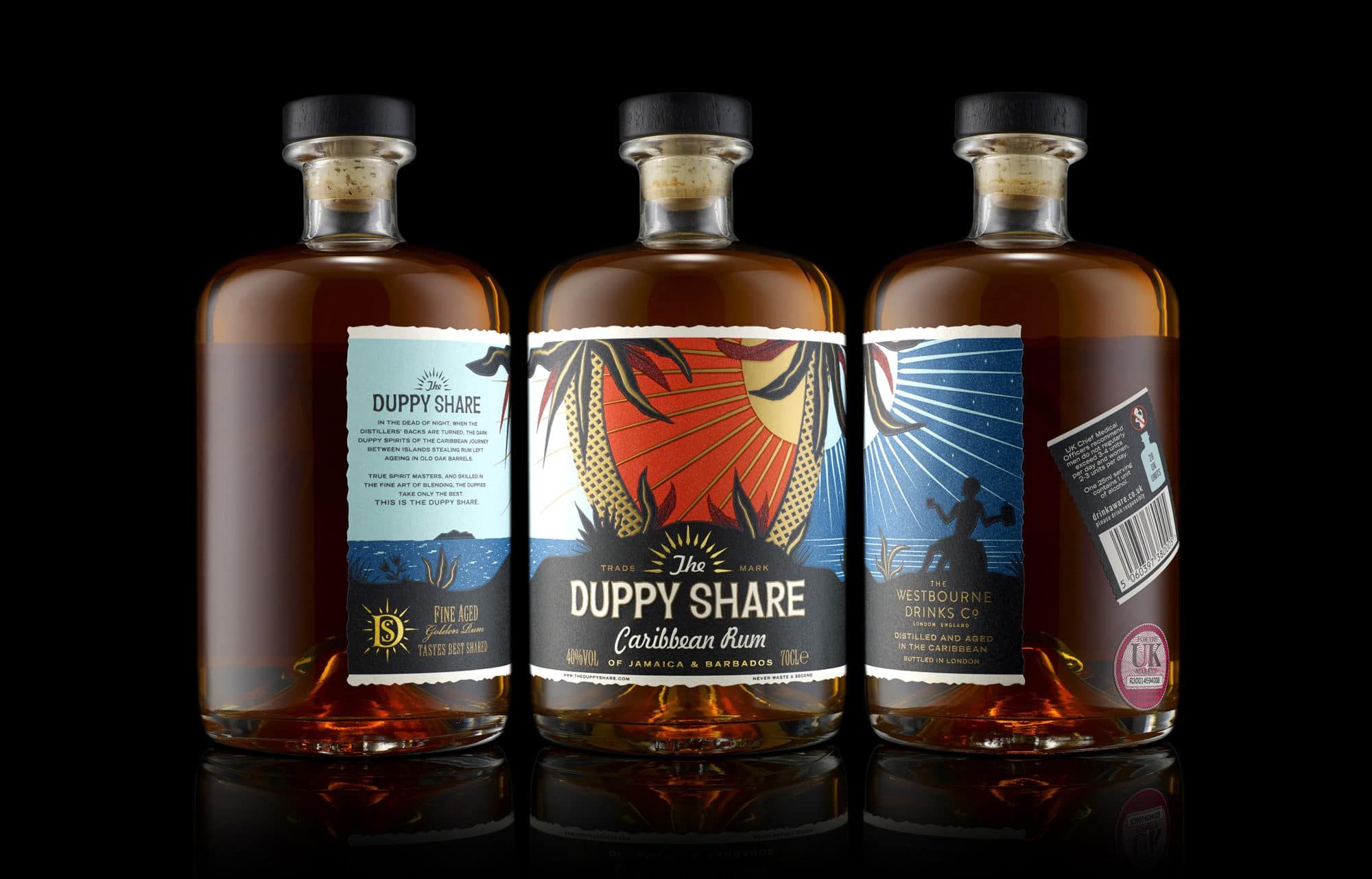Please note: Many of the magazine articles on this site reference events held at our former venue on Kingsland Road. While we no longer operate from that location, we are now proudly based at our new venue on Great Eastern Street.
An Interview with The Duppy Share's George Frost
We sat down with George Frost, founder of award-winning The Duppy Share Caribbean Rum, to talk about mischievous spirits, growing the rum market, perfect serves, and much more besides.

First off, for those that maybe don’t know who you are, could you please just introduce yourself?
Yeah. So my name’s George Frost and I’m the founder of The Duppy Share, which we launched about five and a half years ago.
Tell us a bit about your story, how did you get into the industry initially? Was it a traditional affair or was it a bit more of a road less travelled?
It was definitely a road less travelled. I’ve obviously worked a load in bars, over the years, but never had my own bar or anything like that. Just sort of getting me through uni and stuff like that. But essentially, since we were old enough, me and my brothers, and the rest of my family used to go to the Caribbean and just totally loved it. I love the Caribbean, I love rum. And then it was probably about six, seven years ago I just suddenly realized that for me, rum is all about – and the Caribbean is all about – fun, energy, excitement, and welcoming nature. And yet there was not a single rum brand who was doing that. There were the cheap and tacky ones, the sort of bats and the pirates, and then there are the really old, boring, expensive ones. But yeah, there wasn’t one that was in the middle which had a good spirit, that was fun and kind of different. So I said, “Well, maybe there’s something in this.”
I’m not going to say that was the Eureka! moment, but it was the moment when I was like, “Fuck. I’m going to have to do this, now.”
Not long afterwards I was in a bar on the beach in Barbados, and the bartender was talking to this girl. And I overheard him say, “There’s a concept in whisky called the angel’s share.” So, as whisky evaporates, it goes up to the angels as the saying goes. But in the Caribbean, they don’t believe that shit. They think these crazed spirits called duppies come along, steal the rum, and then go and have a massive party. And I was like, “Oh, whoa, whoa. What’s that called?” And he was like, “No one’s ever asked me that. It’s called the duppy’s share.” And then immediately I was just like, “Bang. That’s fucking fallen into my lap, slightly.”And so yeah. So I’m not going to say that was the Eureka! moment, but it was the moment when I was like, “Fuck. I’m going to have to do this, now.”
So that was six years ago, where basically no one was talking about rum, particularly in London. I’d tell mates, “I’m launching a rum brand,” and they’d be like, “Surely you mean gin?” [laughs]. And the setting it up is like anything, I suppose. As soon as you get any form of success, you completely just completely forget about the time before that. But yeah, things have gone pretty awesomely. I think the main thing that we want to do is not even to change anything. We just had to get across what the Caribbean is. Simple enough. And so our top-line goal, I suppose, is to get more people drinking rum. And then secondly, get more people drinking Duppy because, as you’ll know, being knowledgeable of spirits as you are, rum’s a fucking awesome spirit. And yet, it’s been pretty much ruined by those bats and those pirates who literally just chuck so much sugar into it that it then completely bastardises rum’s reputation. Our first rum, the aged rum, has an incredible five-year-old Barbados rum from Foursquare and a three-year-old rum from Jamaica. They’re made with the same love, talent, and skill as the best whiskeys out there, but they’ll never get that love and respect. So yeah, since launch, I suppose, we’re obviously trying to sell lots of Duppy, but seeing that rum love and respect growing, and the category as a whole growing, particularly in the last two years, has been awesome.
So we just touched on it just there, but why don’t we get a bit more technical. We’ve been concealing some of your rum inside our boxes recently, so do you want to tell some of our readers what actually the liquid is, some of the processes that go into it, what they can expect?
Certainly. Well, I suppose from a liquid perspective, there were loads of sweet rums, there were some of those quite challenging rums, so we wanted to create a rum that could just be a bartender’s go-to, whether that’s for a daiquiri or a rum and coke. We also wanted it to be really unique, to be really deep but not have that burn that some rums tend to have, especially neat. So we basically went through this nine-month process in which we basically went around all the distilleries, getting their rum and tasting it on their own. And then we basically went about working out what our ‘taste spider’ going to be. So they’re kind of shaped like this (makes a rectangular gesture), and it kind of has ‘woodiness’ or ‘perceived alcohol’ or ‘sugar’ marked around it. And you create what we wanted as a Duppy’s spider, which was basically nice and oaky. In terms of perceived alcohol, we didn’t want it to taste obviously very alcoholic, but we also didn’t want it to taste too vanilla. So that was about 5. So these were all marked out in lines on a scale from 0 to 9, with 9 being at the outer limit. ‘Honey butter taste’, that kind of rum flavour of that smoothness, that was 8. And then there was colour; we wanted that to be that perfect gold, like Plantation 5, which is a Bajan rum and very much was one of our.. idols, if you like. There’s definitely a better word. I’ll get back to you on that!


And so, yes, so we had this thing, the Duppy spider. We then knew all of the rums that could lead into it. And then we went to this amazing master blender and embarked on our blending process. Jamaica is mega fun. It’s mega energetic. Yes, parts are quite dangerous, but it’s got that kind of that energy. Barbados is a little bit more chill. It’s more about the beaches, the resorts. And essentially, in that terroir kind of way, the rums really do reflect that character. Jamaican rum is high in esters, punchy, and cuts through loads of different flavours. And the Barbados rum’s way smoother, way more chill. So we suddenly fell in love with this idea of trying to replicate that fusion but in a liquid sense. So we aimed to get the joy of those two islands in our very first rum, the Caribbean Rum. When you taste it you first get the Jamaican three-year-old from Worthy Park, which is high in esters. It cuts through the drink at the beginning. It’s got that great sort of really kind of fruity smell. But if you just had that, it would be like some of the Appleton rums – quite harsh. So, as the flavour develops, you then get that five-year-old rum, which is from Foursquare, which has been gorgeously aged. No added sugar in any of it. And, essentially, it creates this really nice, long tasting rum. So when you swallow it, it’s not just gone like that and it also hasn’t got any of that harshness.
So that leads us quite nicely into the next question – where do you see The Duppy Share working in mixed drinks? What are some of the ideal serves for you?
I suppose the most simple one is a Rum Old Fashioned just because it doesn’t change the flavour that much. And I think– don’t get me wrong; I’ve been drinking kind of Mount Gay Rum Old Fashioneds my whole life, but there’s something about the fact that The Duppy Share Caribbean Rum is a blend. It just makes it a little bit more interesting. I think it also works really well in your classic cocktails – Daiquiris and Mai Tais. Normally, as you know, Daiquiris are, on the whole, made with white rum, rather than aged. However, I think our rum, because of that Jamaican rum, has that ability for it to cut through the lime and yet still provide a really nice, smooth finish.
So with that in mind, as well as our online pivot, particularly over the first lockdown we kind of changed our main mission and aimed at raising as much money as possible, mainly for Hospitality Action.
So, obviously, the past year has been incredibly challenging for the industry as a whole. The coronavirus has been – to use a buzzword we’re all sick of by now – unprecedented. We’ve spoken to a lot of UK-based brand owners about this and the general trend is that this is one of the biggest, if not the biggest, challenge they’ve ever faced, and they’re still facing. So I guess the question is, is this an experience you’ve shared? How have you dealt with it? How has it affected your operations?
Well, I suppose a couple of things to say before we go into it: one, obviously, I’m very fortunate not to have lost anyone directly from it, but, of course, hundreds of thousands of people can’t say that. So any sort of business issue we go through obviously pales into insignificance compared with that. And also, we are part of the hospitality industry, obviously. So people are quick to say, “Oh, God. Has it been awful for you?” And, in short, it hasn’t because, similarly to you guys, we’re in a position where we can do an online pivot. We kept our staff employed, and we didn’t have to change what we’re doing drastically. Whereas, as you’ll know, for every single bar, pub, restaurant, this has been Judgement Day and then some. Armageddon for so many of them. And it’s just so unfair because I think, as you’ll know, the trade as a whole is packed with the funniest, nicest, most welcoming, and hardest-working people. And I don’t think many people – I hope a lot more now – gave those people the respect they deserve.
So with that in mind, as well as our online pivot, particularly over the first lockdown we kind of changed our main mission and aimed at raising as much money as possible, mainly for Hospitality Action. They’re an amazing charity who support the physical and mental health of people in hospitality, and if there’s any sort of silver lining here it’s that they’ve said that the number of people getting in touch with them – from people who have lost their jobs in the trade to people who have been really affected by it – and asking for help has been enormous. So hopefully that’s something that will continue after this happens. But yeah, we’ve raised– I can’t remember exactly how much. I think something like sort of 30-odd thousand pounds, which included me doing my first – and last – ever marathon whilst in lockdown.
I think one of the things that would be amazing, if it can be kind of corrected a little bit, is that feeling of consumers being intimidated when it comes to asking questions, scared of being made to look like they don’t know about drinks.
Amazing stuff. It’s been really heartening to see the industry pulling together and supporting one another during these crazy times. So, on a related note, how do you think activities like our virtual classes can help a brand like yours, considering, as we’ve mentioned, bars obviously been alternating between open and closed over the last few months?
I think it definitely does do something very different to that bar experience. I think we aren’t that brand who if someone pours it in the wrong way or they put in the wrong flavour, then we’d ever care, But yes, people aren’t getting the cocktails made by that sort of brilliant bartender – they’re at home, and they’re making it for themselves. And I think that anything that creates an excuse for a bit of kind of creativity from people at home is a great thing, it’s something you’ve definitely seen from all our UGCers (User Generated Content). So many people are now making cocktails in their own kitchens. Before it may have been a gin and tonic or a rum and Coke, but now, it’s the daiquiri, or it is a mojito, and it does allow people to kind of educate themselves to do it and, as you said, progress a little bit further.
I think one of the things that would be amazing, if it can be kind of corrected a little bit, is that feeling of consumers being intimidated when it comes to asking questions, scared of being made to look like they don’t know about drinks. And I think that really did happen in the past. They want to say Absolut rather than Stolichnaya because they might forget or say it wrong. And I think now is about the chance, because of that refresh hopefully, where people will go to bars and they won’t say, “I’ll have a rum and Coke.” They might say, “What rums do you have?” or, “Oh shit. Yeah. I’d heard that’s happened in gin,” “God, yeah, I never knew that London dry gin couldn’t have added sugar,” and all of that kind of stuff. So I do think there are definite benefits to it. You can tell drinkers during a virtual class environment things that you think are important whereas, obviously, if you did the same thing in a bar, you’d quickly fall behind orders.

I think that if you told people, particularly in England, that rum sells three and half times more than what gin sells globally, they’d be completely bewildered.
I don’t like the word ‘education’. I like the idea that it’s not education. You’re kind of giving someone a quirky fact that they can then go and use elsewhere. As I said earlier; if I gave you two options of society, one where you get lockdown, and you can educate the consumer in a different way, or one where the pubs are open, I think we all know which one we’d go for. But I do love the idea of keeping some of the positives of thing going afterwards, and maybe that is a bit more about consumers not just happy to go to the corner shop to pick up a bottle of wine. They start to know a little bit more about it, and I think that’s one thing that’s really happened in the past twenty years is people are more willing to buy products that have a minimal environmental impact or that have a really good supply chain. I think people nowadays are seeing the brands they buy as almost like an extension of themselves, and so by that very nature, they want to get brands that reflect themselves. And that’s where, I think, the industry is so great because there are so many levers to be pulled in terms of that using the spirits to come and define themselves.
Any exciting horizon, future plans you want to reveal for the Duppy Share here?
I love it how people always try and add intrigue by saying, “I’m not sure whether I’m meant to say this,” but I am truly unsure whether I’m meant to say this! So we’ve got the two rums at the moment – the aged which been out for probably about five-and-a-half years, and then spiced which literally launched the week before the first lockdown. Currently, in two very beautiful bottles but they’re stock bottles at the moment. By April next year (2021), we’re hoping to deliver a bespoke bottle, which very exciting moment for us because it’s another nice kind of tangible step that your making in terms of improving the product. So that’s really exciting, and then we’re really excited about beefing out our range a little. Nothing dramatic, but we’d love to do an XO (Extra Old) one. Also, even though the volumes are tanking globally, I’ve always loved the idea of making a white rum. I think there’s such an opportunity there to kind of do a grand-Nephew (Wray & Nephew) but one that is, perhaps, not over-proofed but really goes big on character both in terms of taste and brand personalities.
So yeah, that’s all really exciting. And then the main thing that’s been going on the whole time but we’re really seeing it pick up a lot now is exports, so we’re now going into fourteen different European territories. We’re in Australia, and this year for us it about breaking into America and China. And what’s so exciting about that, and what we so love about it is it shows that there really is a global love of rum. And I think that if you told people, particularly in England, that rum sells three and half times more than what gin sells globally, they’d be completely bewildered. It’s versatile, which means a lot of people can buy into it, and I think that’s an amazing thing. So yeah, so I supposed the ultimate goal is to continue to grow rum and just try and get rum into as many hands as possible.
